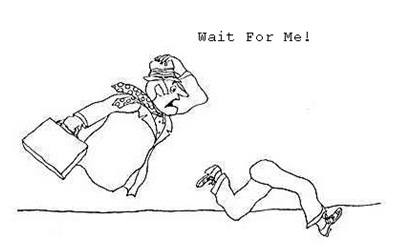THE ELEVENTH HOUR
WRITTEN BY: ADAM CHAN
The Eleventh Hour
By Adam Chan
Between 9am to 5 pm, there are a million things to do. How then we prioritize what to do first? Some may treat this frenzy converging priorities as a routine while some are oblivious to them until … With some many items to prioritize, it’s not unusual to experience repeated eleventh hour or fire fighting situations in today’s pace. One can imagine the many priorities we need to juggle in our daily undertakings. Even humans are created with the amazing natural ability to filter information to manageable chunks; one will not be spared of the anxiety created by any last minute situations.



Inadvertently we take mental shortcuts resulting in stereotyping of certain personalities are more likely to procrastinate. However this is not conclusive. Take this analogy for food for thoughts; a flaming butt will easily break into fire when placed among dry leaves and shrubs but if it is placed in a snowfield, the flaming butt will in no time extinguish into an inert butt. I.e. while we can attribute this trait to nativity but the environment surrounding it must offer favorable conditions for it to fully bloom.
While we can graciously view procrastination as innate traits and this perspective will at mostincrease our tolerant and understanding towards this behavior but it still doesn’t eliminate the inconvenience brought by it. No doubt the eleventh hour rush is not encouraged in most organization; this doesn’t mean there are no merits in the eleventh hour rush. Have you heard of the phrase, creativity out of necessity?
A general belief is that the traits are closely tied to the core of an individual; it remains unchangeable for most cases. If changing the core is an uphill task, why not change the surrounding? Certainly by changing the corporate culture and workplace so that procrastination is not conducive seems like a better proposition.
In a tongue and cheek manner, there are three kinds of people in
this world,
– Those who make things happen
– Those who waiting for things to happen
– Those who wondering what is happening
The first one obviously is not one who procrastinates. Not
quite… people who make things happen if they frequently change their minds
unannounced at eleventh hour is no different from the type two and three.
Sometimes, the impact can be greater. What about the other two? Have you come
across people that might fit into the last two types?
The second and third kind seems likely to procrastinate.
From business perspectives, what does it cost to procrastinate?
Take a look at these three facets where business can be adversely affected.
– Loss credibility
– Duplicated use of resources
– Time wastage
Loss of
Credibility
Eleventh hour work hardly bears quality. At best, it can only be considered as
meeting the minimum mark. Not to mention that it is prone to criticism from
clients. Through sub-standard quality of work, it can leave negative
impressions with the clients. Such impression reflects trust level, commitment
to the task, competency in managing the task or the attitude towards the
engagement. In anyway, all these unfavorable perspectives will surely diminish
the credibility of the service provider. If the clients view the service
provider to have low or no credibility, the business engagement will likely not
develop further. Disgruntled customer simply seeks for alternatives.
Duplicating
of Resources
Can people make sound decisions in the heat of rush? Procurement of supporting
items or services is likely made with incomplete planning or ill-matching
needs. At best, even the right resources are being secured; one may discover
after the rush that they are actually duplicates. Resources can means services,
merchandizes, products and expertise. Such careless management of resources is
common during the eleventh hour.
Unnecessary
Pressure (wasting time)
Last minute doesn’t allow procedures or processes to be streamlined, the
mounting pressure results in ill-use of time in pursuing to complete the tasks.
When under pressure, we can find ourselves doing many things but
only to realize how unproductive they have been after we are calmed and
composed to analyze the past events.

The entire team can experience stresses that will likely lead to disagreements during the heat of the tasks. Frequent disagreements strain relationships among the members. When the strain turned into fracture, the team will under perform to the tasks’ requirements.Ultimately, significant amount of time will be wasted because of the presence of such unnecessary pressure.
Just Do It
Inadvertently we will get in eleventh hour situations in our lives. Last minute changes of requests, instructions, etc these are just some unavoidable situations we encountered from time to time. While we cannot avoid last minute situations, we sure can response to them in stride.
In the early sections, I have mentioned that environment can either augment or diminish the tendency to do things at eleventh hour. Let’s start from building habits upon the individual.
At the individual level, one can always develop the habit of prioritizing the many tasks to be carried out. Have a,
– Task list, a.k.a. To DO list
The ability to create a no-nonsense task list will heighten personal situation awareness. The creator of the list will naturally be more alert to the tasks on the list and this heightened awareness can help in regulating the time and effort allocation to the various tasks. In essence, the tasks will not be forgotten and the right amount of effort can be expended to each task.
It may not mean a lot when an individual is doing this. However if there are sufficient numbers, this mass behavior will take on as the environment characteristics thus it will become self-sustaining.
Induct a group of people to act as the catalyst to develop the anti-procrastination attitude, a.k.a.
– Critical mass.
Leaders are critical in exercising influences on the followers. As long as the leaders are not condoning the eleventh hour attitude, the flaming butt will not burn into fire. It is as important for the leaders to lead by example.
Visibility is the key to shifting or sculpting mindset.
– Reward the behavior, not just the person
Anyone who displays the desired anti-procrastinating habits should be recognized. Giving recognition can be achieved in various means. It can be as simple as giving thanks in-person, writing an email to the deserving person, a phone call, leaving a text message or formally making public announcement during company events. At best, the person can be rewarded. With the behavior visibly recognized, the desire to procrastinate will be kept at bay.
Last but not least, there are only.
– 24 hours in a day
Prioritizing the tasks doesn’t equate to accomplishing all the tasks in any given day. There is wisdom in relenting and letting go as much as pursuing with tenacity. Prioritizing is not merely a skill, it is a paradigm.
Closing Thoughts
Fighting malaria or dengue is not just how effective the treatment is. In fact, to treat means the damage has been done. We all know how to fight malaria and dengue, don’t we?
It is about keeping the environment to a state where mosquito breeding is no longer conducive. If the company has a culture where procrastination simply cannot flourish, it would not happen, right? Obviously the reality and ideal have discrepancies but it is not the ideal we should be aiming for. Instead we should appreciate the role played by the environment in augmenting or diminishing procrastination. With the desired perspectives, we will be motivated to live right.
Changing the environment may seems something external but it takes internalization before people start making changes to the environment to keep it in alignment to our inner thoughts. Do you think that this same principle can be applied to other parallel situations?
System drives behavior and repeated behavior reinforces beliefs. Whatever we don’t wish to have, never allow it to creep into us discreetly for when it comes to light, it may be too late to reverse the situations.
Let’s minimize procrastination but even if you have been a casualty of it, don’t lose the lesson you have gained through the experience.


